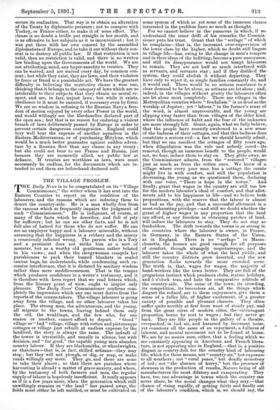THE FRESH RUSSIAN SCARE.
THE importance of the recent incident at Constanti- .1 nople about the passage of a Russian ship through the Dardanelles, has, we feel convinced, been gravely exaggerated ; and we are by no means certain that the exaggeration is due either to newspapers or their agents. What actually occurred, so far as we can understand much- contradicted stories, is that the Porte seized the Russian ship Moscow,' which belongs to the Volunteer Society, on the charge that it was really a man-of-war, and as such forbidden by the Treaty of Paris to pass through the Dardanelles. The Russians, who, for reasons to which we allude below, are exceedingly sensitive about this clause in the Treaty, immediately and violently re- monstrated, and were backed up, probably in a very decided way, by the French Ambassador. They pointed out that the clause was directed against men-of-war, com- mercial vessels being expressly exempted ; that the Mos- cow' was a commercial vessel, the property of a private corporation ; and that the allegation that she had arms or , passengers on board who were Volunteers or discharged soldiers made no manner of difference. They therefore de- manded the release of the vessel, and an indemnity for her seizure ; and the Sultan, greatly alarmed, at once agreed to that settlement of the affair. The incident was simple enough, and has, we believe, occurred before ; but it was at once exaggerated into a great event. It was asserted that the Sultan had either agreed with Russia to cancel the clause in the Treaty of Paris—which he has no sort of right to do without the consent of his co-signatories—or that at least he had agreed to consent in future to a trick by which vessels belonging to the Volunteer Society, even though armed vessels, should not be regarded as vessels belonging to the Russian Government. There is no evidence for either assertion; both of which are to the last degree improbable, the Sultan being at least as much afraid of war, or even diplomatic collisions, as any Sovereign in Europe; but both fell upon very willing ears. The Ger- man Powers and Italy are alike anxious that England should be impelled to join the Triple Alliance, and nothing is so likely to impel her as any suspicion that Russia, in conjunction with France, is secretly plotting to attack her in the Mediterranean by sea. She must resist any such plot by sealing the Dardanelles, and must, if she sent a fleet there, seek for support from the only Powers who would be naturally on her side. We doubt if even diplomatists would be insensible to this consideration, and the German journalists who trust diplomatists were naturally eager in discussion. There was, however, little to discuss, except that Russia and France were in Constantinople, as elsewhere, acting together, and that their informal alliance might be directed against Great Britain, as last week it was alleged to be directed against China.
We do not mean, of course, to assert that Russia would not be glad to puncture ever so small a hole in the Dardanelles provision of the Treaty of Paris. She would be very glad indeed, and so should we if we were in the same position. It is almost an intolerable one. The huge Empire, with its hundred millions of people, its vast Army, and its proud Court, has absolutely for six months in every year no access to the water,—cannot, that is to say, in an emergency send out an armed ship from any of her ports to protect her commerce, or to support her diplomacy. If the Sultan of Morocco, for instance, chose next winter to imprison her Minister, Russia would have to rely on the good offices of some friendly Power until ships and troops could be despatched from Vladivostock, her arsenal at the other end of the world. Archangel and the Baltic are sealed by frost, and the Black Sea by written treaty. Moreover, during those six months she cannot send reinforcements to her Asiatic fleet, though it is doing most important work, and would, were her subjects threatened by China, as French and English subjects are now threatened, be almost the only instrument through which she could even try to obtain redress. That is not a position which any Power can be expected to tolerate for a moment longer than she can help; and to Russia, owing to her vast possessions and interests in Farther Asia, it is especially galling, so galling that the resulting irritation constitutes a permanent menace alike to Persia and to Norway. If Russia could conquer Persia, she would be seated in the Indian Ocean ; and if she could obtain Ham- merfest, she would have a clear exit to the Atlantic from a great harbour situated below the line at which the ocean freezes. Her desire to be rid of the restriction in the Dardanelles is, therefore, entirely natural, and would be entirely blameless if only she would go the direct way to secure its realisation. That way is to obtain an alteration of the Treaty by diplomatic pressure ; not to conspire with Turkey, or France either, to make it of none effect. The clause is no doubt a bridle put straight in her mouth, and is as offensive to her subjects as it is inconvenient ; but it was put there with her own consent by the assembled diplomatists of Europe, and to take it out without their con- sent is to destroy all public law. If that restriction is not valid, then no restriction is valid, and there is no written law binding upon the Governments of the world. We are not attributing, mind, any hyper-sanctity to treaties. They can be waived, and are waived every day, by common con- sent; but while they exist, they are laws, and their violation by force or fraud is a punishable act. We have the greatest difficulty in believing the restrictive clause a wise one, thinking that it belongs to the category of laws which are so intolerable to their subjects that they obtain no moral re- spect, and are, in fact, unjust laws ; but while it exists, obedience to it must be ensured, if necessary even by force. We see no wisdom in refusing to the Russian Navy a free- dom of motion enjoyed by every other Power in the world, and would willingly see the Dardanelles declared part of the open sea ; but that is no reason for enduring a violent breach of laws deliberately passed by Europe in order to prevent certain dangerous contingencies. England could very well bear the expense of another squadron in the Eastern Mediterranean, or of purchasing Mitylene, which would be a much better guarantee against sudden adven- ture by a Russian fleet than any clause in any treaty ; but she could not bear to see France and Russia, just because they are momently allied, set public law at defiance. If treaties are worthless as laws, wars must necessarily be endless, for the documents which are in- tended to end them are beforehand declared null.



































 Previous page
Previous page